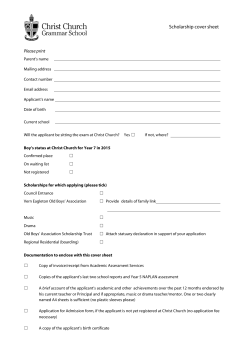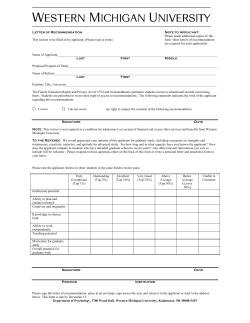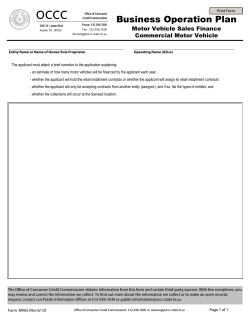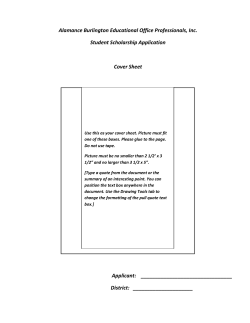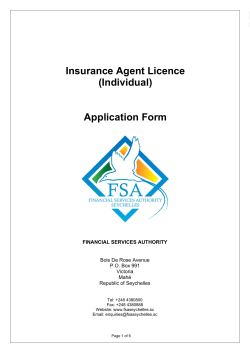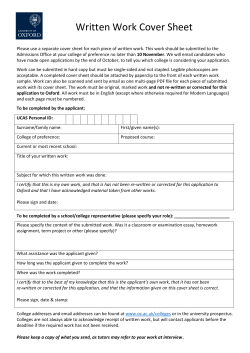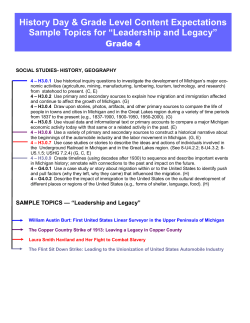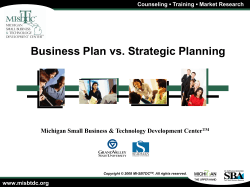
FY15 Professional or Organizational Development Minigrant Program
Professional or Organizational Development FY15 Minigrant Program The Minigrant program is a partnership between the Michigan Council for Arts and Cultural Affairs and our Regional Regranting Agencies throughout the state. Professional or Organizational Development (POD) Minigrants provide up to $1,500 to assist arts organizations, administrators and artists with opportunities that specifically improve their business management and/or brings the artist or the arts organization to another level artistically. To be Eligible... Applicants are limited to registered non-profit arts and cultural organizations and professional artists, located in the state of Michigan. Federal and State agencies are not eligible to apply. Applicants with unmet obligations on prior grants i.e. late/incomplete reports, may not apply (Contact MCACA staff if you are concerned about a prior grant). Funding Basics… Applicants can request a maximum of $1,500. Grants awarded must not exceed 75% of total project cost up to $1,500. A 25% cash and/or in-kind match is required. Funded projects must be completed within the MCACA grant period, 1/1/2015 - 9/30/2015. Applicants may apply to more than one Council program, however, no one applicant may receive multiple grants in the same category during the same fiscal year. Council reserves the right to limit the number of grant awards to any one applicant. Deadline... Applications are to be submitted on-line by 11:59 p.m. October 15, 2014 for Round 1 or by 11:59 p.m. February 2, 2015 for Round 2. The eGrant system will not accept applications after this time. Incomplete applications will not be accepted by the eGrant system. MiniGrant POD Program – Page 1 Minigrant Program Professional or Organizational Development Contents Getting Started .............................................................................................................................. 3 Grantee Responsibilities & Requirements ................................................................................... 3 Professional Development Guidelines…....................................................................................... 6 E-grant Application Instructions ..................................................................................................... 6 Assurances...................................................................................................................................... 13 Professional Development Opportunities........................................................................................ 14 MCACA Michigan Economic Development Corporation 300 N. Washington Square Lansing, MI 48913 Regional Regranting Information: (517) 241-4011 fax: 517-241-3979 www.michiganbusiness.org MiniGrant POD Program – Page 2 Getting Started . . . The Minigrant program is a competitive grants-giving partnership funded by the State of Michigan through the Michigan Council for Arts and Cultural Affairs (MCACA) and administered by agencies in the 10 State of Michigan Prosperity Regions. Professional and Organizational Development: grants that provide up to $1,500 to assist arts organizations, arts professionals and artists with unique experiences that are directly related to career or organizational development. Proposals cannot be geared toward the creation of a specific art project, but must clearly demonstrate how the proposal will benefit the organization or individual long-term. Fast Facts: • Applicants to the Minigrant Program must use the MCACA on-line application at mcaca.egrant.net (no www). Use the instructions in this document as a guide. • No one applicant may receive multiple grants within the same category during a fiscal year. • Applicants must make the required minimum cash and/or in-kind match to their grant award. • Grant activity must take place between January 1, 2015 and September 30, 2015. • Deadline to apply: Round 1 - October 15, 2014 Round 2 - February 2, 2015 • All Minigrant applicants who are arts and cultural organizations are strongly encouraged to participate in the Cultural Data Project, www.miculturaldata.org. Two years data must be submitted into the system. • All applicants are strongly encouraged to notify their legislators of their grant submission. Please note that if a grant is awarded you will be required to notify your legislators of your grant award. A copy of this letter or email must be submitted with the signed grant agreement. • Due to IRS regulations, MCACA will verify all applicant organization’s current nonprofit status by verifying that a form 990 has been filed in the last three years. Grantee Responsibilities and Requirements Accessibility MCACA strives to make the arts accessible to all people and this is a priority of its funding programs. Funded organizations agree to make every attempt to ensure that programs are accessible to persons with disabilities. According to state and federal law, every publicly funded organization must place itself in the position of being able to provide accommodations when persons with disabilities make requests for services. For a list of resources on accessibility, visit www.nea.gov/resources/ Accessibility/AccessLinks.html. Underserved Communities It is the Council’s long-term goal to make quality arts and cultural programs and services available to all 83 counties in the State of Michigan. In order to accomplish that MCACA has identified 45 underserved communities. An underserved community is defined as one in which people lack access to arts programs, services or resources due to geography, economic conditions, cultural background, sociopolitical circumstances, disability, age or other demonstrable factors. The term “community” can refer to a group of people with common heritage or characteristics, whether or not living in the same place. MiniGrant POD Program – Page 3 Eligibility Michigan registered nonprofit arts and cultural organizations and professional artists are eligible in this program. Organizations must ensure no part of net earnings benefit a private individual. Donations to the organizations must be allowable as a charitable contribution under section 170c of the Internal Revenue Code of 1954 as amended. (Organizations with status under Section 501(c)(3) of the IRS Code and local Units of Government meet this criteria.) Professional artists are defined as one who is recognized by his/her peers within the discipline, has a minimum of 2 years in the discipline and is compensated for their art form. A graduate or undergraduate level course in an arts degree or certificate program where credits or a degree are sought is not eligible. Applicants that have unmet obligations on current grant agreements, such as overdue or incomplete reports or other significant problems, are not eligible to apply for future funding. If any applicant fails to meet MCACA requirements on a current grant agreement, their pending application will be removed from the review process. If any applicant fails to meet MCACA requirements on a current grant, following Council approval on a FY14 application, the newly approved grant will be rescinded. Auxiliary support organizations (i.e. friends of xyz), may not apply in this grant program. Federal and State of Michigan agencies, divisions or departments are not eligible to apply for funding from MCACA. Match POD recipients are required to make a minimum 25% cash and/or inkind match. State funds may not be used as matching funds. Any additional matching funds, over and above the required cash match, may include other cash, earned revenue, contributions, and “in- kind” funds which represent a reasonable value of services, materials, and equipment, as allowed under federal Internal Revenue Service code for charitable contributions. Also, there are certain expenses that may occur during the year that should not appear on the itemization required with awardee’s Final Reports. Items such as: costs involved in the start-up of a new organization, costs incurred prior to the grant starting date, indirect costs for the handling/management of grant funds, awards or cash prizes, fund raising events, reception costs, out of state travel, etc. See application instructions for complete details. Grantees must sign a grant agreement detailing terms for the use of Council funds. Please note that the grant agreement will detail the scope of work and the payment schedule. Veterans Affairs Veterans provide our workforce with a high-level skill set built through brave service to America. They bring the advantages of being immersed in a training environment, and their technical skills, strengths in strategic thinking, and versatility are just a few of the very tangible talents that make them valuable to any employer. The arts are also a powerful, therapeutic tool in the healing process for many combat veterans reintegrating back into society and transitioning back into civilian life. Therefore the Council encourages organizations to provide veterans of all eras and all branches of the military with opportunities in the arts. Providing both a foundation for their work and freedom to pursue it as they see fit, is the best means to bringing quality work forward while maintaining assistance to veterans and artists. The Fine Print Grantees who are local governmental units are subject to the requirements of the government-wide common rule, “Uniform Administrative Requirements for Grants & Cooperative Agreements to State and Local Governments.” Nonprofit organizations, inclusive of colleges and universities, are subject to the requirements of OMB Circular A-110, “Uniform Administrative Requirements for Grants and Agreements with Institutions of Higher Education, Hospitals, and Other Nonprofit Organizations.” OMB Circular A-133, “Audit of States, Local Governments and Nonprofit Organizations,” includes specific guidance for conducting financial and compliance audits. The threshold for requiring an audit is $500,000 in yearly expenditures of Federal awards. This amount is the aggregate of funds from all Federal sources. MiniGrant POD Program – Page 4 Grantees are required to assure the Council that they intend to comply with Title VI of the Civil Rights Act of 1964; Section 504 of the Rehabilitation Act of 1973; the Americans with Disabilities Act of 1990 (ADA); the Age Discrimination Act of 1975; and title IX of the Education Amendments 1972, where applicable. Title VI prohibits discrimination on the grounds of race, color or national origin; Section 504 prohibits discrimination on the basis of disability; ADA prohibits discrimination on the basis of disability; the Age Discrimination act prohibits discrimination on the basis of age; and Title IX prohibits discrimination on the basis of sex. Grantees must assure the Council that professional performers and/or related or supporting personnel employed in projects funded by the Council shall not receive less than the prevailing minimum compensation as determined by the Secretary of Labor. Labor standards set out in Part 505. (29CFR) “Labor Standards on Projects or Productions Assisted by Grants from the National Endowment for the Arts.” In addition, grantees must assure the Council that no part of projects funded by the Council will be performed or engaged in under working conditions which are unsanitary or hazardous or dangerous to the health and safety of employees engaged in such projects. Grantees should use cost accounting principles which comply with requirements as set forth in Federal OMB Circular A-122, “Cost Principles for Nonprofit Organizations,” A-87 for Local governments, or A-21 for Educational Institutions. When purchasing equipment and products under a Council grant, grantees are encouraged to purchase American-made, preferably Michigan-made, equipment and products. Grantees are required to execute projects and/or productions in accordance with the requirements of National Endowment for the Arts regulations implementing Executive Order 12549, “Debarment and Suspension,” certifying that neither it nor its principals is presently debarred, suspended, proposed for debarment, declared ineligible, or voluntarily excluded from participation in this transaction by any federal department or agency. Grantees are prohibited from conducting general political lobbying, as defined in relevant statutes, regulations and OMB circular within a Council funded project. Travel outside the United States, its territories, Mexico and Canada not identified in the grant application must be specifically approved in writing by the Council before travel is undertaken. Such travel, if approved, must comply with applicable state and federal regulations. According to section 11 of your Grant Agreement, Council support must be credited and included in all publicity, media materials and during each broadcast promotion of the activity. When NEA funds are included in the award, the support credit should read: “This activity is supported in part by the Michigan Council for Arts and Cultural Affairs and the National Endowment for the Arts.” The Grant Agreement will indicate if NEA funds are included as part of your award. Grantees must submit, in a Council supplied format, a final report. The final report must include a narrative summary of outcomes, financial statement, detailed financial itemization, and publicity materials from the activity (i.e. publication materials, photographs and news stories). Selected grantees may also be required to submit an interim report. Grantees are required to keep on file and make available upon request the following support documentation: A list of dates and amounts of all grant payments received; documentation of all expenditures made using grant funds and matching funds, including copies of paid invoices, receipts, timesheets, payroll records, and tax withholding reports. Documentation of in-kind donations should include volunteer work schedules, copies of receipts given to donors for in-kind donations, an explanation of how the value of each donation was determined, or other supporting documentation. MiniGrant POD Program – Page 5 Professional or Organizational Development Guidelines The Michigan Council for Arts and Cultural Affairs recognizes the importance of on-going executive education and leadership development for professional arts administrators, artists and organizations. The Professional or Organizational Development grant program provides funding to assist nonprofit arts organizations, arts professionals and artists with opportunities that will specifically improve their business management and/or brings the artist or the arts organization to another level artistically. Applications in the POD program cannot be geared toward the creation of a specific art project, but must clearly demonstrate how the proposal will benefit the organization or individual in the long-term. These grants are strictly intended to assist arts administrators and artists with unique experiences directly related to career or organizational development. The maximum amount of an award is $1,500 per organization/individual per year. POD grants support a variety of nonprofit organizational and individual needs, which strengthen the capacity of the organization and individual to do business in Michigan. These dollars can be used to attend conferences, workshops, seminars or to hire short-term consultants. The following categories ONLY are eligible for funding under this grant program: • Conferences/Education/Training. Educational opportunities for staff, board members or artists to increase knowledge and skills that support the mission of the organization or the work that they do. A list of professional development opportunities can be found on page 14. • Working with a consultant. Funding for a consultant to provide assistance with strategic planning, coalition building, fund-raising planning, needs assessment, grant writing, or board governance. Funding Levels Funding requests have a maximum of $1,500. Grants awarded must not exceed 75% of total project costs. A 25% cash or in-kind match is required. POD Review Criteria Professional Development Request (Conferences/Education/Training): Briefly describe the activity, including the name and presenting organization of the training, workshop or conference. Who will be attending the professional development activity and their role within the organization, if applicable? How will the activity contribute to or improve the organization or individual? How will information be disseminated to your colleagues and/or the public-at-large? Be sure to include amount requested as well as the expected expense. MCACA request must not exceed 75% of total project cost up to $1,500. Organizational Development Request (Working with a consultant): Briefly describe the purpose of your request and how you intend to use the consultant. Who on the board or staff will have primary responsibility for shaping the project, working with the consultant and implementing the results? How will the activity contribute to or improve the organization? Be sure to include amount requested as well as the expected expense. MCACA request must not exceed 75% of total project cost up to $1,500. How grants are evaluated: • Does the activity fit within the funding criteria as stated above? • Will the activity contribute to building the development/improvement of the organization or individual? • Is the budget for the project realistic and reasonable? MiniGrant POD Program – Page 6 eGrant Application Instructions • Applicants must apply using the online eGrant system. Go to mcaca.egrant.net (no www.) • Codes are supplied by drop-down tabs in the eGrant system. • The word “project” here in the instructions refers to all activities that funds are being requested for, regardless of which category you choose. • Please use the same eGrant account for each application. Be sure to write down your username and password. Section 1: Applicant Information Enter the legal name, other commonly used names, official mailing address, telephone number and office hours of the organization. Use exact spellings. Don’t use abbreviations unless part of the official name. All correspondence will be sent to this address. Authorized Official Enter the name and title of the person who is authorized to sign official papers. This person cannot be the same as the project director. Board Chairperson Enter the name and title who bears ultimate authority and responsibility on behalf of the applicant organization. If you are an individual applying please leave this section blank. Federal Identification Number Enter the applicant organization’s nine-digit Federal Identification Number (EIN) or Social Security Number. This number is recorded on 990 Tax Returns and on W-2 forms. DUNS Number Enter the applicant organization’s nine-digit Data Universal Numbering System or DUNS Number. This number issued by Dun & Bradstreet is a unique numeric identifier assigned to a single business entity. DUNS number assignments are free for all businesses. If one does not exist for your business location, it can be created within one business day. For more information visit http://fedgov.dnb.com/webform. If you are an individual applying please leave this section blank. Status Code--Describes Legal Status This indicates the applicant organization’s legal status. Institution Code--This is used to identify the applicant organization. Discipline Code--This describes primary area of work for the applicant organization. Grantee Race--Select the statement that best represents 50 percent or more based on code description for the applicant organization. Applicant organizations should code themselves based on the predominant group of which their staff or board or membership (not audience) is composed. MiniGrant POD Program – Page 7 Section 2: Program Area Select Minigrant Program Section 3: Project Information Category -- Professional Development Component -- None Project Director (contact person) This is the person to whom questions concerning this application will be addressed. Include address, email and phone number(s). This person cannot be the same as the authorizing official. If you are an individual applying please leave this section blank. Project / Activity Title Enter the project’s working title, choose a brief descriptive title. Project Description Enter a description about the program (100 words or less). Amount Requested: Enter the grant amount requested for your project. Start date/end date Enter the dates of your grant activity. These dates must be within the grant award period of January 1, 2015 to September 30, 2015. Project Primary Discipline Code Select the discipline that best describes the primary discipline of the project/activity. Project Race/Ethnicity Select the statement that best reflects the activity for this grant: If the majority of the grant activities are intended to involve or act as a clear expression or representation of the cultural traditions of one particular group, or deliver services to a designated population listed, choose that group. If the grant activity is not designated to reach or represent any one particular group, choose “no single group.” Type of Activity Code Choose the activity that is the best general description of what the organization is planning to do. Project Primary County Code(s) Enter the county in which the activity takes place. The applicant organization’s location and the project location may differ. Enter all counties that apply. If you are entering multiple counties, enter them in alphabetical order as directed on the form. Arts Education Code An arts education project is defined as: An organized and systematic educational effort with the primary goal of increasing an identified learner’s knowledge and/or skills in the arts with measurable outcomes. Projects not fitting the definition of arts education stated above should choose “None of this project involves arts education,” this selection does not affect your grant score. MiniGrant POD Program – Page 8 Project Descriptors Select the descriptor(s) below that comprise a significant portion (50 percent or more) of the grant’s resources /activities. Select all that apply or none, this selection does not affect your grant score. A Accessibility - grants or services related to ADA/504 compliance or other activities designed to increase access to the arts for persons with disabilities. I International - programs or activities supporting any of the following: grantees visiting other countries, foreign artists visiting the USA, any cultural exchange program, linkages with artists or institutions in other countries, or establishing/administering international programs in your own agency. P Presenting/Touring - grants or services resulting in the movement of artists and artworks for performances, readings, screenings, exhibits, etc., in different geographic areas. Select this to indicate funds awarded for either the hosting/presentation of works originating outside of the grantee community or for the fees paid to artists or arts organizations that will, themselves, be touring in different areas. T Technology - grants or services using technology for the creation or dissemination of artworks or the use of technology for organizational management purposes. V Veterans – programs or activities designed primarily to serve veterans. Arts related or arts programming specifically involving veterans as primary project participants or beneficiaries. Y Youth at Risk - grants or services designed primarily to serve at-risk youth. Include arts- related intervention programs (for violence, drug/alcohol abuse and crime) as well as other programming specifically involving at-risk youth as primary project participants or beneficiaries. Section 4: Summary Information The information should represent your projects and estimates for the entire grant period. Awardees will be required to provide actual participant numbers in the final grant report. Section 4a -- Project Participation Summary Michigan Artists Participating Enter the number of Michigan artists taking part in the professional development opportunity. Amount Paid to Michigan Artists Enter the amount paid to Michigan artists involved in the professional development opportunity. Artists Participating Enter the total number of artists involved in the professional development opportunity. (this total number should include Michigan artists). Amount Paid to Artists Enter the total amount to be paid to artists involved in the professional development opportunity. (this total should include the amount paid to Michigan artists). Individuals Benefitting Count direct project participants, service providers and any staff, board members or other partners directly involved with the grant activity. Do not use the total number of individuals served by all programs of the organization receiving the grant award. Figures should encompass only those individuals directly affected by or involved in the funded activity, and should include the totals from the Artists Participating and Youth. MiniGrant POD Program – Page 9 Youth Benefitting Enter the total number of children and youth (including students, participants, and audience members) who will directly benefit. This figure should reflect a portion of the total number reported in Individuals Benefitting. New Hires Enter the number of full time employees/equivalents that will be hired by the applicant organization in the coming year. Do not include contract workers. A full time employee is defined as someone who works a minimum of 35 hours a week and receives a W2* from the organization. A part time employee is defined as someone who works less than 35 hours a week and receives a W2* from the organization. A contractual worker would be someone who receives a 1099** from the organization. To calculate full time employees/equivalents: 1 employee who works 35 plus hours a week + 1 employees who works less than 35 hours a week = 1.5 employees/equivalents Employees Enter the number of full time employees/equivalents for the applicant organization. Do not include contract workers. A full time employee is defined as someone who works a minimum of 35 hours a week and receives a W2* from the organization. A part time employee is defined as someone who works less than 35 hours a week and receives a W2* from the organization. A contractual worker would be someone who receives a 1099** from the organization. To calculate full time employees/equivalents: 4 employees who work 35 plus hours a week + 3 employees who work less than 35 hours a week = 5.5 employees/equivalents *W2 refers to Form W-2, a United States federal tax form issued by employers and stating how much an employee was paid in a year. **1099 refers to the Form 1099 series, a United States federal tax form which is used to report various types of income other than wages, salaries, and tips (for which Form W-2 is used instead). An example of a reportable transaction are amounts paid to a non-corporate independent contractor for services. Section 4b -- ADA Information Enter the appropriate response. Unless the question states otherwise, the information you provide on ADA compliance should be project specific. Section 5: Required Attachments Files should be uploaded as PDF documents. Do not create PDFs of your electronic documents by scanning, PDFs created this way are much larger and of lower quality. Do not embed non-printable media files (video and/or sound) or static images in your PDF documents. Please do not enable any document security settings or password-protect any PDF files you submit to us. If you are uploading images, audio or visual files it is recommended to limit the size to 5MB. The 10 attachments must be submitted as uploads with your online application: Attachment 1 Attachment 2 Attachment 3 Attachment 4 Attachment 5 Attachment 5 – 10 Narrative Project Budget Staff/Project/Artists Bio Assurances IRS Determination Letter (if needed) Supplemental Material (optional) Note: Attachments should be named as indicated below and converted to a PDF document. MiniGrant POD Program – Page 10 Attachment 1 -- Proposal Narrative Name this file Narrative-OrganizationName (example: Narrative-Quincyyouththeater.pdf) Submit up to two narrative pages. Do not use type size smaller than 12 point. Leave a minimum margin of 1" on all sides. Failure to adhere to formatting criteria may result in a loss of points. Be sure to number and include the name of the organization on each page. For the narrative, refer to the Review Criteria as an outline and guide to describe the FY15 activities you wish to be supported. Address each numbered Review Criteria in order. Remember that panelists score application based on the completeness of your answers to each review criteria, and some criteria are worth more points than others. Also provide an outline/timeline in the narrative for your FY15 activities, if applicable. MCACA encourages applicants to include hyperlinks and URLs of your website, links to videos, artist websites, marketing materials, Facebook pages, etc. that are pertinent to an organization’s grant application. Brief bios of key decision makers and artists are also useful to panelists. This information should be incorporated into your narrative under relevant Review Criteria. Attachment 2 -- Project Budget Name this file Budget-OrganizationName (example: Budget-Quincyyouththeater.pdf) Provide a detailed itemization of your projected project budget. This itemization must show a 75:25 cash and/or in-kind match to your request. You cannot use state funds as matching funds. Keep complete records and receipts. A sample budget itemization can be found on page 16. Further, please be aware that there are certain expense items that are not only inappropriate for MCACA funding, but should also not be included in the itemized budget. Those • • • • • • • • • • • • • • • items are: Costs associated with the start-up of a new organization. Costs incurred prior to the grant starting date. Indirect costs for the handling/management of grant funds and fundraising. Purchase awards, cash prizes, scholarships, contributions or donations. Entertainment or reception functions. Historical Projects without a clear cultural focus. Payments to endowments. Existing deficits, licensing fees, fines, contingencies, penalties, interest or litigation costs. Publication, records, films of a commercial nature, i.e. works of questionable artistic value produced to realize quick market profit. Creation of textbooks/classroom materials. College or university faculty exhibitions or performances. Internal programs at colleges or universities. Commissioning of their faculty by colleges or universities. Scholarly or academic research, tuition, or activities, which generate academic credit or formal study toward an academic or professional degree. Capital improvements, new construction, renovation or permanent equipment items unless part of a Capital Improvement grant. MiniGrant POD Program – Page 11 Attachment 3 -- Staff, Project and Artist Bio Name this file Bios-OrganizationName (example: Bios-Quincyyouththeater.pdf) Provide appropriate staff, project and artists bios as it relates to your application. Be sure to describe the representation of diverse communities defined by, but not limited to, race, ethnicity, gender, age and disabilities. This attachment is limited to three pages. Attachment 4 -- Assurances Name this file Assurances-OrganizationName (example: Assurances-Quincyyouththeater.pdf) This form can be found on page 13 of these guidelines or by clicking on the Assurances document link within the eGrant system under Required Attachments, this form must accompany your application. If you are unable to provide an official electronic signature then you must sign, scan and upload the signed document as an attachment to your application. It is strongly encouraged that the document is a pdf. If you are unable to scan and upload this form please mail it in. Attachment 5 -- IRS Determination Letter Name this file IRS-OrganizationName (example: IRS-Quincyyouththeater.pdf) Organizations are only required to submit the IRS Determination letter if you have not completed a 990 to the IRS. Individuals applying can move to the next attachment. Attachment 5 - 10 -- Supplemental Materials Name this file Sample#-OrganizationName (example: Sample8-Quincyyouththeater.pdf) Use the remaining open attachments to upload additional materials or samples of the work regarding your project that will assist the peer panel in reviewing your application. Files may include PDFs, visual, audio and video files. Be sure to name accordingly based on attachment number. Please note file size should be limited to 5MB. Application Submission Applications are to be submitted on-line: Round 1 -- October 15, 2014 by 11:59 p.m. Round 2 -- February 2, 2015 by 11:59 p.m. The eGrant system will not accept applications after this time. Incomplete applications will not be accepted by the eGrant system. The successful submission of your application does not confirm the accuracy of the grant application, materials uploaded or that it will receive funding. The Council and the Regranting Agency are not responsible for incorrectly uploaded materials or the inability to open attachments. The Michigan Council for Arts and Cultural Affairs and the Regranting Agency reserves the right to retain a copy of application materials for archival purposes and its permanent record. All application materials are public records. Keep a complete copy of your application for your file. MiniGrant POD Program – Page 12 Michigan Council For Arts and Cultural Affairs ASSURANCES A: The applicant has an established policy of equal opportunity without regard to race, color, religion, national origin, age, sex or disability. The applicant agrees to take steps necessary to correct any under-representation reported on the status report and achieve a reasonably representative work force at all levels of employment. The applicant has an established policy to provide equal opportunity on all programs, activities and services. The applicant: 1. Agrees in all recruiting materials and advertisements to state that all job applicants will receive equal consideration for employment; 2. Agrees in all promotional materials and advertisements to state that all programs, activities and services will be provided equally; and 3. Agrees to post in conspicuous places, notices setting forth the law on equal opportunity in employment and public accommodations. B: If the grant is awarded, the applicant gives assurances to the Michigan Council for Arts and Cultural Affairs, that the support funds will be administered by the applicant. C: Any funds received under this grant shall not be used to supplant funds formally budgeted for same and that funds received will be used solely for the contracted activities. D: The applicant has read and will conform to the Guidelines. E: The filing of this application by the undersigned, officially authorized to represent the applicant organization has been duly approved by the governing board of the applicant organization. o This application was approved by the governing board on / / o This application is scheduled to be approved by the governing board on / / If the application has not yet been approved by your governing board, notify the Council staff of the action taken as soon as possible. If the notification of action by your governing board is not received prior to panel review, the application may not be recommended for funding. Organization name: Grant Program: Authorized Official: (Cannot be the Project Director) Name (typed) __Date Signature: MiniGrant POD Program – Page 13 Professional Development Opportunities Americans for the Arts – AFTA serves, advances and leads the network of organizations and individuals who cultivate, promote, sustain, and support the arts in America. AFTA provides many valuable resources but also hosts an annual convention, Arts Advocacy Day as well as the Nancy Hanks Lecture Series. www.artsusa.org National Arts Marketing Project – NAMP provides information, tools and practical ideas to design high quality, cost effective marketing programs and strengthen arts organizations. NAMP provides trainings, workshops, online resources as well as a national conference. www.artsmarketing.org Kennedy Center – providing a multitude of professional development opportunities including Arts Edge, a free digital resource for teaching and learning in, through and about the arts; DeVos Institute of Arts Management, which trains, supports and empowers arts managers and their boards locally, nationally and internationally; Arts Accessibility Office, focusing efforts on accessibility services for patrons and visitors, professional development for cultural administrators and career opportunities in the arts for people with disabilities as well as conferences regarding special education and the arts. www.kennedy-center.org American Museums Association – AMA works to build the foundation for excellence and unite the museum field. AMA provides workshops, webinars and an annual conference. http://aam-us.org Association of Performing Arts Presenters – APAP provides a platform and the necessary tools to facilitate knowledge, discovery, advancement and distribution. APAP hosts a variety of professional development opportunities including an annual conference. www.apap365.org National Guild for Community Arts Education – supports and advances access to lifelong learning opportunities by providing research and information resources, professional development and networking opportunities. www.nationalguild.org Association of Children’s Museums – ACM works to strengthen children’s museums to be essential community assets by: establishing standards for professional practice, convening conferences, collecting research and best practices. www.childrensmuseums.org ArtsMidwest – provides tools and resources to assist the advancement of the arts throughout the Midwest region and beyond. ArtsMidwest also hosts Arts Lab, Arts Learning Xchange and an annual conference. www.artsmidwest.org MiniGrant POD Program – Page 14 Michigan Museums Association – MMA works to disseminate information about best practice in museums as well as facilitate the process of peer learning within the Michigan museums and cultural community. MMA provides workshops, peer learning and an annual conference. www.michiganmuseums.org Michigan Presenters Network – MPN provides information about best practices for performing arts presenters by hosting professional development opportunities as well as hosting an annual conference. www.michiganpresenters.org Michigan Nonprofit Association – MNA serves nonprofits to advance their missions. This is done by providing research, resources and professional development opportunities around the state. www.mnaonline.org Michigan Municipal League – MML represents municipalities to help them sustain highly livable, desirable and unique places within the state. League seminars, trainings and events provide up to date information on major issues and concerns facing communities. www.mml.org SmArts Program – The Arts Council of Greater Lansing has developed a professional development program for creatives which includes workshops, trainings and business resources. www.lansingarts.org NEW – helps nonprofits succeed by strengthening nonprofit management. NEW offers Southeast Michigan nonprofits resources, technology and services to meet the challenges of doing more with less. http://new.org BEST Project – BEST works to strengthen the nonprofit sector of Flint and Genesee County by providing capacity building support and technical assistance. http://bestprojectonline.org NorthSky Nonprofit Network – provides a variety of learning vehicles including workshops and webinars on a wide range of topics to help meet the need of nonprofits in the Grand Traverse area. www.northskynonprofitnetwork.org MiniGrant POD Program – Page 15 ITEMIZATION TEMPLATE INCOME CASH INKIND TOTALS REVENUE - EARNED TOTAL EARNED INCOME $ - REVENUE - UNEARNED Corporate, Foundation & Private support $ - $ 200 $ 175 $ 1,500 $ 1,875 Other unearned revenue Applicant Cash $ 200 InKind revenue Itemized in expense column $ 175 MCACA grant request TOTAL CASH REVENUE EXPENSES - CASH Employee expenses CASH MCACA share In-Kind TOTALS Non-employee costs Additional project related costs Other expenses Conference Registration Meals Travel Hotel TOTAL EXPENSES $ $ $ $ 500 175 700 500 $ 175 $ 500 $ $ 500 500 $ 1,875 $ 1,875 MiniGrant POD Program – Page 16
© Copyright 2025
